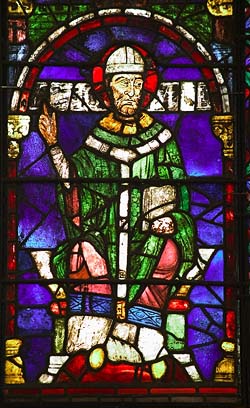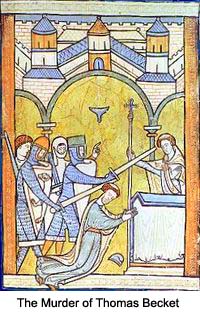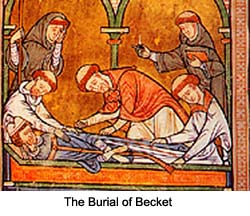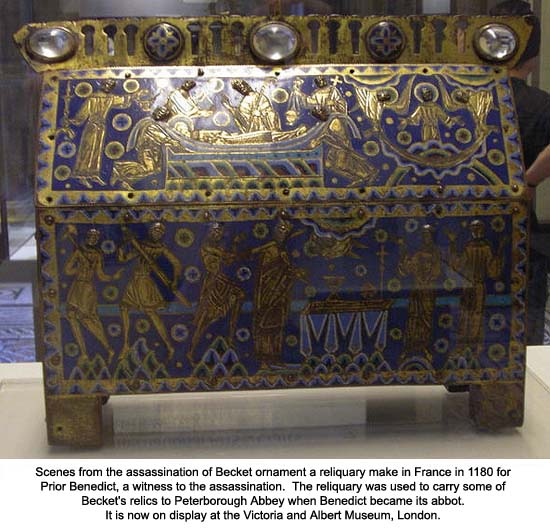Thomas Becket: Canterbury's Martyred Saint
 St Thomas Becket (December 21, 1118 - December
29, 1170) was Archbishop of Canterbury from 1162 to 1170. He
engaged in a conflict with King Henry II over the rights and
privileges of the Church and was assassinated by followers of the
king in Canterbury Cathedral. He is also commonly known as Thomas
à Becket, although some consider this incorrect. St Thomas Becket (December 21, 1118 - December
29, 1170) was Archbishop of Canterbury from 1162 to 1170. He
engaged in a conflict with King Henry II over the rights and
privileges of the Church and was assassinated by followers of the
king in Canterbury Cathedral. He is also commonly known as Thomas
à Becket, although some consider this incorrect.
Thomas Becket was born in London sometime between 1115 and 1120,
though most authorities agree that he was born December 21, 1118,
at Cheapside, to Gilbert of Thierceville, Normandy, and Rosea or
Matilda of Caen. His parents were of the upper-middle class near
Rouen, and Thomas never knew hardship as a child.
One of Thomas's father's rich friends, Richer de L'aigle, was
attracted to the sisters of Thomas. He often invited Thomas to
his estates in Sussex. There, Thomas learned to ride a horse,
hunt, behave, and engage in popular sports such as jousting. When
he was 10, Becket received an excellent education in "Civil
& Canon Law" at Merton Priory in England, and then
overseas at Paris, Bologna, and Auxerre. Richer was later a
signer at the Constitution of Clarendon against Thomas.
Upon returning to the Kingdom of England, he attracted the notice
of Theobald, Archbishop of Canterbury, who entrusted him with
several important missions to Rome and finally made him
archdeacon of Canterbury and provost of Beverley. He so
distinguished himself by his zeal and efficiency that Theobald
commended him to King Henry II when the important office of Lord
Chancellor was vacant.
Henry, like all the Norman kings, desired to be absolute ruler of
his dominions, both Church and State, and could find precedents
in the traditions of the throne when he planned to do away with
the special privileges of the English clergy, which he regarded
as fetters on his authority. As Chancellor, Becket enforced the
king's danegeld taxes, a traditional medieval land tax that was
exacted from all landowners, including churches and bishoprics.
This created both a hardship and a resentment of Becket among the
English Churchmen. To further implicate Becket as a secular man,
he became an accomplished and extravagant courtier and a cheerful
companion to the king's pleasures. Young Thomas was devoted to
his master's interests with such a firm and yet diplomatic
thoroughness that scarcely anyone, except perhaps John of
Salisbury, doubted his allegiance to English royalty.
King Henry even sent his son Henry, later the "Young
King", to live in Becket's household, it being the custom
then for noble children to be fostered out to other noble houses.
Later that would be one of the reasons his son would turn against
him, having formed an emotional attachment to Becket as a
foster-father. Henry the Young King was reported to have said
Becket showed him more fatherly love in a day than his father did
his entire life.
Archbishop Theobald died April 18, 1161, and the chapter learned
with some indignation that the king expected them to choose
Thomas his successor. That election took place in May, and Thomas
was consecrated on June 3, 1162, in accordance with the king's
wishes.
At once there took place before the eyes of the astonished king
and country an unexpected transformation in the character of the
new archbishop. Having previously been a merry, pleasure-loving
courtier, Becket became an ascetic prelate in simple monastic
garb, fully devoted to the cause of the hierarchy and prepared to
do his utmost to defend it. Most historians agree that Becket
begged the king not to appoint him archbishop, knowing that this
would occur, and even warning the king that he could not be loyal
to two masters. Henry could not believe that his closest friend
would forsake their friendship, and appointed him to the
archbishopric anyway -- something he came to regret the rest of
his life.
In the schism which at that time divided the Church, Becket sided
with Pope Alexander III, a man whose devotion to the same strict
hierarchical principles appealed to him, and from Alexander he
received the pallium at the Council of Tours.
On his
return to England, Becket proceeded at once to put into execution
the project he had formed for the liberation of the Church in
England from the very limitations which he had formerly helped to
enforce. His aim was twofold: the complete exemption of the
Church from all civil jurisdiction, with undivided control of the
clergy, freedom of appeal, etc., and the acquisition and security
of an independent fund of church property.
 The king
was quick to perceive the inevitable outcome of the archbishop's
attitude and called a meeting of the clergy at Westminster
(October 1, 1163) at which he demanded that they renounce all
claim to exemption from civil jurisdiction and acknowledge the
equality of all subjects before the law. The others were inclined
to yield, but the archbishop stood firm. Henry was not ready for
an open breach and offered to be content with a more general
acknowledgment and recognition of the "customs of his
ancestors." Thomas was willing to agree to this, with the
significant reservation "saving the rights of the
Church." But this involved the whole question at issue, and
Henry left London in anger. The king
was quick to perceive the inevitable outcome of the archbishop's
attitude and called a meeting of the clergy at Westminster
(October 1, 1163) at which he demanded that they renounce all
claim to exemption from civil jurisdiction and acknowledge the
equality of all subjects before the law. The others were inclined
to yield, but the archbishop stood firm. Henry was not ready for
an open breach and offered to be content with a more general
acknowledgment and recognition of the "customs of his
ancestors." Thomas was willing to agree to this, with the
significant reservation "saving the rights of the
Church." But this involved the whole question at issue, and
Henry left London in anger.
Henry called another assembly at Clarendon for January 30, 1164,
at which he presented his demands in sixteen constitutions. What
he asked involved the abandonment of the clergy's independence
and of their direct connection with Rome; he employed all his
arts to induce their consent and was apparently successful with
all but the Primate.
Finally even Becket expressed his willingness to agree to the
constitutions, the Constitutions of Clarendon; but when it came
to the actual signature, he defiantly refused. This meant war
between the two powers. Henry endeavoured to rid himself of his
antagonist by judicial process and summoned him to appear before
a great council at Northampton on October 8, 1164, to answer
allegations of contempt of royal authority and malfeasance in the
Lord Chancellor's office.
Becket denied the right of the assembly to judge him, appealed to
the Pope, and, asserting that his life was too valuable to the
Church to be risked, went into voluntary exile on November 2,
1164 embarking in a fishing-boat which landed him in France. He
went to Sens, where Pope Alexander was, while envoys from the
king hastened to work against him, requesting that a legate
should be sent to England with Denary authority to settle the
dispute. Alexander declined, and when Becket arrived the next day
and gave him a full account of the proceedings, he was still more
confirmed in his aversion to the king.
Henry pursued the fugitive archbishop with a series of edicts,
aimed at all his friends and supporters as well as Becket
himself; but Louis VII of France received him with respect and
offered him protection. He spent nearly two years in the
Cistercian abbey of Pontigny, until Henry's threats against the
order obliged him to move to Sens again.
 Becket regarded himself as in full
possession of all his prerogatives and desired to see his
position enforced by the weapons of excommunication and
interdict. But Alexander, though sympathizing with him in theory,
favoured a milder and more diplomatic way of reaching his ends.
Differences thus arose between pope and archbishop, which became
even more bitter when legates were sent in 1167 with authority to
act as arbitrators. Disregarding this limitation on his
jurisdiction, and steadfast in his principles, Thomas treated
with the legates at great length, still conditioning his
obedience to the king by the rights of his order. Becket regarded himself as in full
possession of all his prerogatives and desired to see his
position enforced by the weapons of excommunication and
interdict. But Alexander, though sympathizing with him in theory,
favoured a milder and more diplomatic way of reaching his ends.
Differences thus arose between pope and archbishop, which became
even more bitter when legates were sent in 1167 with authority to
act as arbitrators. Disregarding this limitation on his
jurisdiction, and steadfast in his principles, Thomas treated
with the legates at great length, still conditioning his
obedience to the king by the rights of his order.
His firmness seemed about to meet with its reward when at last
(1170) the pope was on the point of fulfilling his threats and
excommunicating the king, and Henry, alarmed by the prospect,
held out hopes of an agreement that would allow Thomas to return
to England and resume his place. But both parties were really
still holding to their former ground, and the desire for a
reconciliation was only apparent.
The tension between the two men would only be relieved by
catastrophe. Passionate words from the angry king (reputedly
"Will no one rid me of this meddlesome priest?",
"Who will rid me of this low-born priest?", "Who
will rid me of this turbulent priest?", or even "What a
band of loathsome vipers I have nursed in my bosom who will let
their lord be insulted by this low-born cleric!") were
interpreted as a royal command, and four knights -- Reginald
Fitzurse, Hugh de Moreville, William de Tracy, and Richard le
Breton -- set out to plot the murder of the archbishop. On
Tuesday, December 29, 1170, they carried out their plan,
murdering Thomas Becket at the entry of the Quire in Canterbury
Cathedral as he was leading the monastic community in
Vespers.
Most historians agree that Henry didn't actually intend for
Becket to be murdered, despite his harsh words. Following his
murder, it was discovered Becket wore a hairshirt under his
archbishop's garments. Soon after, the faithful throughout Europe
began venerating Becket as a martyr, and in 1173 -- barely three
years after his death -- he was canonized by Pope Alexander. On
July 12, 1174, in the midst of the Revolt of 1173-1174, Henry
humbled himself with public penance at Becket's tomb, which
became one of the most popular pilgrimage sites in England until
it was destroyed during the Dissolution of the Monasteries (1538
to 1541).
In 1220, Becket's remains were relocated from
this first tomb to a shrine in the recently completed Trinity
Chapel. The pavement where the shrine stood is today marked by a
lighted candle. Modern day archbishops celebrate the Eucharist at
this place to commemorate Becket's martyrdom and the translation
of his body from his first burial place to the new shrine.
 Local legends in England connected with Becket arose after his
canonization. Though they are typical hagiographical stories,
they also display Becket's particular gruffness. Becket's Well,
in Otford, Kent, is said to have been created after Becket had
become displeased with the taste of the local water. Two springs
of clear water are said to have bubbled up after he struck the
ground with his crozier. The absence of nightingales in Otford is
also ascribed to Becket, who is said to have been so disturbed in
his devotions by the song of a nightingale that he commanded that
none should sing in the town ever again. In the town of Strood,
also in Kent, Becket is said to have caused that the inhabitants
of the town and their descendants be born with tails. The men of
Strood had sided with the king in his struggles against the
archbishop, and to demonstrate their support, had cut off the
tail of Becket's horse as he passed through the town.
Local legends in England connected with Becket arose after his
canonization. Though they are typical hagiographical stories,
they also display Becket's particular gruffness. Becket's Well,
in Otford, Kent, is said to have been created after Becket had
become displeased with the taste of the local water. Two springs
of clear water are said to have bubbled up after he struck the
ground with his crozier. The absence of nightingales in Otford is
also ascribed to Becket, who is said to have been so disturbed in
his devotions by the song of a nightingale that he commanded that
none should sing in the town ever again. In the town of Strood,
also in Kent, Becket is said to have caused that the inhabitants
of the town and their descendants be born with tails. The men of
Strood had sided with the king in his struggles against the
archbishop, and to demonstrate their support, had cut off the
tail of Becket's horse as he passed through the town.
St. Thomas of Canterbury remains the patron saint of Roman
Catholic secular clergy. In the Roman Catholic calendar of
saints, his annual feast day is 29 December.
Related Articles:
- Canterbury: Still the Perfect Pilgrimage!, by Julia Hickey
- https://www.timetravel-britain.com/articles/towns/canterbury.shtml
- Canterbury Cathedral, by John P. Seely
- https://www.timetravel-britain.com/articles/churches/canterbury.shtml
More Information:
We regret that we no longer have the resources to maintain up-to-date links and/or hours and pricing details for the various sites and attractions listed on this website. For more information about the location(s) listed above, please use your favorite search engine or visit Wikipedia.
Article and images reprinted from Wikipedia.org (stained glass photo courtesy of Britainonview.com).
|
